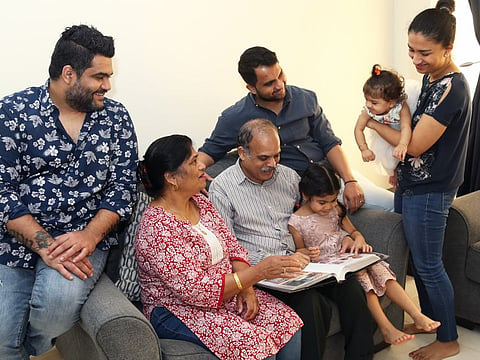‘Those days won’t come back’: Longtime Indian couple in UAE retires, heading home
Expat who gave job interview in Bombay did not expect to spend 42 years in Sharjah

Dubai: When Indian expat Albert Barretto came to the UAE in 1978, he expected to stay only a few years. But he ended up spending 42 years. Now, he and his wife Gracy Barretto are returning home after their retirement.
Barretto, as a young graduate in Mumbai (then known as Bombay), India’s business capital, was looking for a job. A representative of a Sharjah-based company was headhunting there for the right candidate for some electrical projects. “A relative recommended I try for the vacancy as everyone wanted to go to the Gulf countries. I gave the interview and was selected. I thought maybe I will spend a few years in the UAE, see how it goes. As it turned out, I got married, brought my wife here in 1984, raised my two sons Roger and Richard here, and even got to spend time with my two granddaughters here,” Barretto, now 61, said.
Barretto changed jobs only twice in the UAE, and recently retired as an electrical engineer from a Sharjah-based electrical switch gears company after working there for over 30 years. His wife also retired as a supervisor at a Sharjah school, which she had joined as a teacher in 1992. The couple will be relocating to Pune, a city in India’s Maharashtra state, where they have a home. Thursday is their last day in the UAE. “I knew this day would eventually come, when I would return to India. I just didn’t know it would be after so long,” he said.
Sandy swathes, wooden shacks
Barretto has seen the rapid and thorough transformation of Sharjah and Dubai over the decades. When he first landed in Sharjah, the city had huge swathes of sandy areas between wooden cafeteria shacks. “It still looked more or less like a desert. There was a ‘Bottle Building’ that was the tallest building in Sharjah; it’s still there, in Abu Shagara area, but barely stands out anymore because of so many tall buildings now. On the weekends, the popular place to hang out with friends was the gold souk, also known as the central souk. It didn’t even have air-conditioning back then. We used to go to St Michael’s Church, which is also still there,” said Barretto about the late 70s.
Dh1 taxi fare
Things were not only different, but less expensive too. A ‘shared taxi’ cost just Dh1 while an ‘engaged taxi’ cost Dh5 only, anywhere within Sharjah. Though Barretto’s own accommodation was company provided, he said a one-bedroom flat in Sharjah cost around Dh8,000 in annual rent back in the day. “What I miss is those days we didn’t have distractions like mobile phones and laptops. We would have quality time with friends, go to the beach, go on picnics, go fishing. We would catch crabs late at night in Al Khan. There was a small lagoon there; it’s all buildings now. They said the moonlight brought out the crabs; I made lots of fresh crab dinners. There was a different essence of those days, which won’t come back.”
Waiting in line to call home
Like other expats, Barretto would have to visit the office of the telephone company and wait in line to place a call to India. Paying monthly bills also meant visiting the office and standing in line at the counter. “Then came the era of pagers, the company would page you if they wanted to get a hold of you when you were in the field. Then you would find the nearest phone booth and call them. Now everyone can be live on a video call, it’s so easy now,” Barretto said. “The way the UAE has progressed is remarkable. We feel even more secure and the younger generation has so many opportunities for education and employment. Telecommunications and shopping has become so much more convenient. The UAE never stops growing, it has the latest technology.”
What now?
Barretto plans to spend time with his mother in Pune as well as other family members “safely in the pandemic”. The couple also wants to go sightseeing and visit religious sites in India. “After working hard for so many years, we want to settle down. I used to tell my folks back home stories from the UAE when I would visit on holidays. Now, we’ll sit together and go more in detail,” Barretto said.
Only one regret
Barretto said the only thing he regrets when he looks back at a lifetime of calling UAE his second home, is the fact he didn’t learn how to speak Arabic. It wasn’t easy to learn Arabic as almost all his colleagues were from India, and Hindi and English were — and are — widely used in day to day life.
‘I would like to thank the UAE’
Barretto said: “I want to thank the UAE, its leaders who have governed it so well, and its frontline workers for keeping us safe, as well as its people for making our stay here so pleasant for me and my family. I’m also grateful also to my wife and children for giving me such a wonderful time in the UAE.”
His son Richard, 32, said: “What my brother and I have learnt from my parents is they had to work really hard, doing overtime, to give us a good education and upbringing. We’ve seen their dedication to work and family. Of course, we also cherish the memories together and the stories they’ve told us of their early days in the UAE.”





